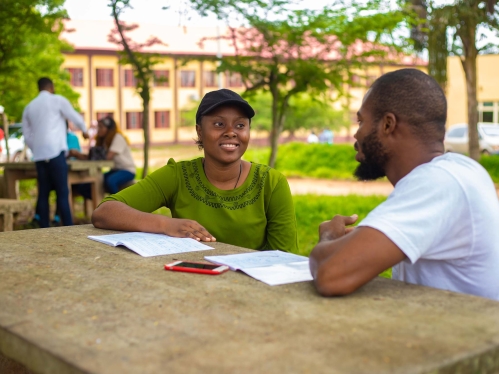
Addiction Counselor Training (ACT) Certificate
Pathway to LCADC and CCGC
Dual-licensed clinicians (LCADC/LCSW or LPC) will be the clinical leaders in NJ. The Addiction Counselor Training (ACT) Certificate program can help you earn your LCADC to become one of these exclusive professionals!
Beginning in 2020, clinicians graduating from the MSW/ACT program will meet the educational requirements for two licenses (LCADC, LCSW) and one certification (CCGC). This program - the first of its kind nationwide - will train the future clinical leaders in NJ and can help you become one of these specialized and in-demand clinicians!
The ACT program is the first program in the country to provide social workers with the educational training to qualify for accreditation as a Certified Compulsive Gambling Counselor (CCGC). In New Jersey, that certification qualifies licensed clinicians to treat problem gamblers through a state-sponsored program administered by the Compulsive Gambling Council of New Jersey. The training also meets the national standards set by the International Certification Board of the National Council on Problem Gambling in Washington, D.C.
Curriculum at a Glance
ACT Program Philosophy
Mission
The Addiction Counselor Training (ACT) Certificate Program mission is to advance New Jersey’s addiction and mental health treatment delivery by training graduate level clinicians to use theory driven, outcomes oriented, empirically supported interventions, thus improving the lives of diverse populations struggling with addictions and co-occurring disorders.
Vision
The Addiction Counselor Training (ACT) Certificate Program will be a model for Workforce Development Initiatives, becoming an exemplary training program for dual licensed clinicians who will advance the professionalism of addictions counseling and the treatment of people with addictions and co-occurring disorders.
Values
The administration and participants in the Addiction Counselor Training (ACT) Certificate Program value:
- Respectful, effective, integrated interventions for people with addictions and co-occurring disorders
- Viewing both addiction and mental health disorders as primary, and supporting integrated care as a model for increased, universal access to quality addiction and mental health treatment in NJ
- Fostering a culturally and linguistically competent addiction professional workforce representative of the diverse communities served
- Improving the knowledge and skills of addiction professionals through education about theory-driven, evidence-based intervention
- Examining and contributing to research about addiction and mental health disparities based on race/ethnicity, socioeconomic status, geographic location, gender, age, and sexual orientation
- Integrating the culture and context of the people with whom we work into respectful philosophies, policies, treatment practices, and service adaptations
- Reducing stigmatization and discrimination among treatment providers, families, organizations, institutions, and the general public
The ACT program is guided by SAMHSA’s vision of recovery from mental disorders and/or substance use disorders.
- "A process of change through which individuals improve their health and wellness, live a self-directed life, and strive to reach their full potential."
Further, ACT recognizes SAMHSA’s four major dimensions that support a life of recovery.
"Health: overcoming or managing one’s disease(s) or symptoms - for example, abstaining from use of alcohol, illicit drugs, and non-prescribed medications if one has an addiction problem - and for everyone in recovery, making informed, healthy choices that support physical and emotional wellbeing.
Home: a stable and safe place to live;
Purpose: meaningful daily activities, such as a job, school, volunteerism, family caretaking, or creative endeavors, and the independence, income and resources to participate in society; and
Community: relationships and social networks that provide support, friendship, love, and hope."
In addition, ACT supports SAMHSA’s Guiding Principles of Recovery
"Recovery emerges from hope: The belief that recovery is real provides the essential and motivating message of a better future - that people can and do overcome the internal and external challenges, barriers, and obstacles that confront them. Hope is internalized and can be fostered by peers, families, providers, allies, and others. Hope is the catalyst of the recovery process.
Recovery is person-driven: Self-determination and self-direction are the foundations for recovery as individuals define their own life goals and design their unique path(s) towards those goals. Individuals optimize their autonomy and independence to the greatest extent possible by leading, controlling, and exercising choice over the services and supports that assist their recovery and resilience. In so doing, they are empowered and provided the resources to make informed decisions, initiate recovery, build on their strengths, and gain or regain control over their lives.
Recovery occurs via many pathways: Individuals are unique with distinct needs, strengths, preferences, goals, culture, and backgrounds - including trauma experiences - that affect and determine their pathway(s) to recovery. Recovery is built on the multiple capacities, strengths, talents, coping abilities, resources, and inherent value of each individual. Recovery pathways are highly personalized. They may include professional clinical treatment; use of medications; support from families and in schools; faith-based approaches; peer support; and other approaches. Recovery is non-linear, characterized by continual growth and improved functioning that may involve setbacks. Because setbacks are a natural, though not inevitable, part of the recovery process, it is essential to foster resilience for all individuals and families. Abstinence from the use of alcohol, illicit drugs, and non-prescribed medications is the goal for those with addictions. Use of tobacco and non-prescribed or illicit drugs is not safe for anyone. In some cases, recovery pathways can be enabled by creating a supportive environment. This is especially true for children, who may not have the legal or developmental capacity to set their own course.
Recovery is holistic: Recovery encompasses an individual’s whole life, including mind, body, spirit, and community. This includes addressing: self-care practices, family, housing, employment, education, clinical treatment for mental disorders and substance use disorders, services and supports, primary healthcare, dental care, complementary and alternative services, faith, spirituality, creativity, social networks, transportation, and community participation. The array of services and supports available should be integrated and coordinated.
Recovery is supported by peers and allies: Mutual support and mutual aid groups, including the sharing of experiential knowledge and skills, as well as social learning, play an invaluable role in recovery. Peers encourage and engage other peers and provide each other with a vital sense of belonging, supportive relationships, valued roles, and community. Through helping others and giving back to the community, one helps one’s self. Peer-operated supports and services provide important resources to assist people along their journeys of recovery and wellness. Professionals can also play an important role in the recovery process by providing clinical treatment and other services that support individuals in their chosen recovery paths. While peers and allies play an important role for many in recovery, their role for children and youth may be slightly different. Peer supports for families are very important for children with behavioral health problems and can also play a supportive role for youth in recovery.
Recovery is supported through relationship and social networks: An important factor in the recovery process is the presence and involvement of people who believe in the person’s ability to recover; who offer hope, support, and encouragement; and who also suggest strategies and resources for change. Family members, peers, providers, faith groups, community members, and other allies form vital support networks. Through these relationships, people leave unhealthy and/or unfulfilling life roles behind and engage in new roles (e.g., partner, caregiver, friend, student, employee) that lead to a greater sense of belonging, personhood, empowerment, autonomy, social inclusion, and community participation.
Recovery is culturally-based and influenced: Culture and cultural background in all of its diverse representations - including values, traditions, and beliefs - are keys in determining a person’s journey and unique pathway to recovery. Services should be culturally grounded, attuned, sensitive, congruent, and competent, as well as personalized to meet each individual’s unique needs.
Recovery is supported by addressing trauma: The experience of trauma (such as physical or sexual abuse, domestic violence, war, disaster, and others) is often a precursor to or associated with alcohol and drug use, mental health problems, and related issues. Services and supports should be trauma-informed to foster safety (physical and emotional) and trust, as well as promote choice, empowerment, and collaboration.
Recovery involves individual, family, and community strengths and responsibility: Individuals, families, and communities have strengths and resources that serve as a foundation for recovery. In addition, individuals have a personal responsibility for their own self-care and journeys of recovery. Individuals should be supported in speaking for themselves. Families and significant others have responsibilities to support their loved ones, especially for children and youth in recovery. Communities have responsibilities to provide opportunities and resources to address discrimination and to foster social inclusion and recovery. Individuals in recovery also have a social responsibility and should have the ability to join with peers to speak collectively about their strengths, needs, wants, desires, and aspirations.
Recovery is based on respect: Community, systems, and societal acceptance and appreciation for people affected by mental health and substance use problems - including protecting their rights and eliminating discrimination - are crucial in achieving recovery. There is a need to acknowledge that taking steps towards recovery may require great courage. Self-acceptance, developing a positive and meaningful sense of identity, and regaining belief in one’s self are particularly important."


About Us
In 2011, Rutgers University Center of Alcohol Studies and the School of Social Work were funded $3.4 million from the NJ Department of Human Services - Division of Mental Health and Addiction Services for an Addiction Counselor Training (ACT) Certificate Program. Lia Nower, JD, PhD, Professor and Director of the Center for Gambling Studies at the School of Social Work (ACT@ssw.rutgers.edu) is the current director of the project.
The ACT Certificate Program’s primary goal is to educate master’s and doctoral-level clinicians who wish to prepare for licensing in their mental health profession and as addictions counselors (LCADC). Dual credentialed clinicians are in great demand in our state and across the country, particularly for leadership positions in organizations that treat both mental health and substance abuse disorders.
The ACT Certificate Program provides a 6-course curriculum that covers all 5 domains and the educational hours needed for the CADC/LCADC. The program includes supervised practicum learning in DMHAS-approved agencies that addictions professionals need to earn the credential. Participants that already have a clinical master’s degree have the option to EITHER independently obtain employment in a DMHAS-approved agency OR register and pay for supervised practicum learning through the ACT program. Students accepted into the program will also receive mentorship and preparation for the licensing exams.
Contact Us
For more information, please email ACT@ssw.rutgers.edu.
Locations
All ACT courses are offered in online synchronous format (with scheduled class meetings). In summer or winter session, they are offered in online asynchronous format (no class meetings).


The Addiction Counselor Training (ACT) Certificate program provides:
- All the required LCADC education hours in a 6-course curriculum
- Training to qualify for accreditation as a CCGC
- Convenient hybrid course format that reduces in-class hours to 4 days per semester
- Courses on Fridays and Saturdays
- All the required supervised practicum learning hours in a DMHAS-approved treatment organization (Posgrads employed at an NJSAMS agency may be able to apply their employment hours toward the experience hours required for the Certificate)
- Preparation for the application process and licensing exams
- Individualized advising and specialized workshops
- Mentorship from dual-credentialed clinicians and other addiction professionals

Who can apply?
- Clinicians with a master's or doctoral degree in a counseling/mental health discipline who wish to earn their LCADC
- MSW students who wish to earn their LCADC education hours while taking the courses required for the MSW degree
- Masters or doctoral students in other counseling disciplines wishing to earn their LCADC education hours while completing their degree



To Apply
Students in the Traditional (on campus) MSW program (2-year, 3-year, 4-year, or advanced standing), new incoming students entering the Traditional MSW program in the fall, and clinicians with a master's or doctoral degree in a counseling/mental health discipline may apply to ACT. If you are an MSW student in a program other than the Traditional, you would have to switch to the Traditional MSW program to participate in ACT.
Please consult the chart at the bottom of the Certificates main page (go.rutgers.edu/MSWCertificate) for application deadlines and the link to the application.
